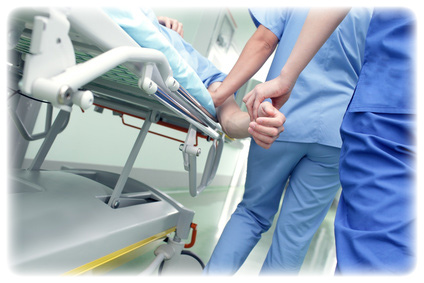Professional Connections has been very busy working on our latest project with King Faisal Specialist Hospital & Research Centre with facilities in the capital city of Riyadh and coastal city of Jeddah, Saudi Arabia, an American allied country. KFSH&RC, as it is known, is the leading national referral center for oncology, organ transplantation, cardiovascular diseases, neurosciences and genetic diseases so we are recruiting nurses for all of these areas.
In particular, KFSH&RC is very focused at the moment on pediatric oncology - their King Fahad National Center for Children's Cancer and Research is the only children's cancer center in Saudi Arabia, and it is modelled after the world-renowned St. Jude's in Memphis.
Why is paediatrics such a focus for KFSH?
Pediatrics here is like paediatrics nowhere else in the world because you don't see the type and variations of cancer that we have in many other countries. The immunology diseases and the allergies that we see - some of them you couldn't find in textbooks so it is a huge learning opportunity for our nurses, especially if you have any interest in oncology, immunology, or as I like to say "any -ology" aspect of nursing, working here is brilliant experience.
Often parents don't bring in the children until they are in the last stages, especially when they live outside of Riyadh, which at times can be challenging. While KFSH&RC is the leading tertiary hospital, a lot of our patients come from outside of Riyadh so they might go first to a local hospital who might tell them "Yes you should go ahead and go, and get a referral" or "No- we can handle things here." At times the child may become ill, and they eventually get referred to us. So we see a lot of very, very sick children that require a lot of input. We give a lot of high-risk medication. As a leader and as a staff nurse we often deal with patient care sitters and interventional stuff.
If you could share one piece of advice with a nurse considering applying to KFSH, what would you say?
In this role we show a huge amount of compassion! So compassion is the main thing. While there are translators here, it is an advantage to learn just a little Arabic before you get here - even being able to just to say "Hello", "Thank you", and How are you?" goes a long way.
Our families place so much trust in our nurses. They expect and need, our nurses to be there for them, be their eyes and ears, and help them through the many emotional aspects when a child has cancer. Speaking just a few words of their language can go a long way to helping a family member feel more relaxed.
Being new in Saudi Arabia one may not realize the following: When a child dies, after 24 hours, the child does not get mentioned again. It is part cultural and part religious. While we have a lot of Muslims in the UK, I thought I understood this fairly well, but actually coming here has been a new education for me. So that is one of the biggest things you have to understand is the cultural element of nursing care and how it impacts on the whole process of nursing.
Ann: Tell our readers about a typical day for you and your colleagues.
Sue: In paediatrics we cover everything. We have a specific bone marrow and stem cell transplant ward that is in the main hospital site.
So in the main hospital, we have the haematology, bone marrow and stem cell transplant unit. There is another wing which is the follow-up unit, where we have the acute haematology and oncology children. Children in this unit are being prepared for a transplant or post-transplant, or those that have come back in through the emergency department, who are in shock or septic so we have quite acute admissions. We have a throughput of patients from this unit into PICU unit and then back to the unit. So we have a swinging door really with the PICU. The skills required here are an understanding of haematology, especially stem cell and bone marrow transplant. The difficulty here is finding like-for-like donors. Of course, we have a lot of sibling donors and other things - for example, cord donation.
One of our units is called B-3 - In this unit, they give a lot of chemotherapy and high-risk blood products so there are a lot challenges even for highly skilled nurses. It is also it a very rewarding unit. This unit worked a few years ago with their head nurse and they are now called a "star unit" because of the story about the starfish. When you come on the unit, people will tell you all about the story of the starfish as that's how they got their name and how they developed things. On this unit they have their own clinical instructor who is well versed in BMI and stem cell transplant, and there are a lot of in-service with staff. Our staff is currently looking at what they can do to help people before they tell us the problem.
Then we have A2 which is the pediatric surgical ward that has EMT liver transplant and renal transplant and general surgery. So again there's a lot of variety on this unit too. This unit recently started to take renal transplant patients. They have had liver transplant patients now for 18 months. So in total they have 8 transplant beds, and at any one time, they have a minimum of 6 transplant children on the ward. So that is a lot of very fast turn over.
Various competencies are required on these units around surgery, lots of nasogastric, naso duodenal tubes, dealing with kids with ascites. We have the new renal transplants that are coming in and learning how to deal with these patients. We have to send some of them who are struggling postoperatively to dialysis several times during their stay. This unit, like B3, works closely with PICU because of how sick some of these children are when they end up having their transplant. We have a lot of the mothers who donate part of their liver for the transplant so often we have the mom coming to stay in the ward the day after to sit with their child. So we attend to their needs as well.
And then there is the third ward on the main hospital campus which is B1 - the medical ward. In this ward, they deal with all type of medical, immunology and allergy and medical genetics. We have a high incidence of medical genetic conditions. A lot is rooted in marriage issues. We have started a genetic screening system now where a lot of young couples come and find out what their chances are for medical genetic problem with any children they plan to have. So again another very challenging, but interesting, nursing ward. They also take children from PICU who are waiting to go home on home ventilation. So very different than what you would see in other hospitals.
Ann: How do you manage to up-skill the nurses to look after the ventilated child?
Sue: The ward nurses have learnt it all, and we have a respiratory therapist that will come and work with them. They now have a child who has been ventilated on the ward for 11 months. It's a great way to learn additional skills and also for some nurses, it gives them great insight if they want to move around into PICU and get that experience.
Ann: What can you tell our readers about King Fahad Children's Cancer Center?
Sue: Our other campus is the King Fahad Children Cancer Center - you'll see it frequently abbreviated to CCC.
CCC is a special cancer center and that is where the vast majority of children with hematology, oncology, and solid tumor children (who will have had their main treatment on the main campus) are having follow-up treatments or follow-up admission for various reasons. It is modelled after St. Jude's in Memphis, TN.
There are two wards at the CCC - a very, very busy day medical unit and an out-patient unit. They have a lot of palliative care aspects of children care. Occasionally, you see children who are admitted because they have become acutely unwell, and will have to be transferred up to the main site.
Ann: Do you rotate nurses between two sites?
Sue: No we don't. We did try when I first arrived, but we found it's quite difficult because it the CCC is about 45 minutes away from our main facility.
So we look at the skills the nurse has to offer and see where the best fit is for them to be on a team. This way, we use their skills appropriately, and we place them in the right place.
That is not to say if we place a nurse somewhere and during the 90 days probationary period they say to us "I am not happy," - of course we will look to move them somewhere we think they would be happy. We will spend time the time it takes, and we will work with nurse and staff who are coming here. I have only been here 7 months, and I've already moved 4 people who have come to me and said "This isn't what I thought I coming to." So we sat down, and worked together through a plan and got them to a position where they are happy.
It is important that you not be afraid to say "This is what I came for..." After all, you've come from home - thousands of miles away, and you must not be fearful to say "This is what I came for..." Depending on where you are coming from, it is very different. This is especially important for English nurses coming here because we have an American system - a lot here is based on the American system, so for some, it is a transition.
Ann: Can you speak about that a little bit please?
Sue: The biggest difference is that in the UK nurses are very much the autonomous practitioner and are on a level footing with their medical colleagues. In the past it has been a physician driven organization. Doctors are the lead and the nurses follow instructions, and nurses don't really question as strongly as they do in the UK. But we have been actively working to change this philosophy. With our Magnet journey we are messaging the strength of nursing and our impact on patient care
It's quite interesting because the nurses here are now starting to question autonomy. They want the challenge! We are going through a transition at the moment. This is going to be a change in the whole process in the organization.
Ann: Is this Magnet driven?
Sue: Sure, I think Magnet is helping with changing this process. Some of the foundational principles for Magnet are to be empowered, innovative, collaborative and strongly advocate for patients. In addition, a lot of our doctors have spent time outside of Saudi Arabia, and they too are starting to question: Why we are working this way? Why we are not working more collaboratively?
For example, we have a monthly collaborative meeting which is all levels of staff from all aspects of Pediatrics. It's like a grand round meeting. We come first thing in the morning for an hour, and someone that has changed something or wants to do something new, will do a short presentation. Then the floor is open for everybody to ask questions or suggest something and that is working brilliantly. The month after, we do a follow up, to determine latest progress.
Ann: Can you speak about KFSH&RC 's Magnet Journey?
Sue: It's our journey to excellence, and it's about looking at transformational leadership and striving people to move things forward. We have developed a professional practice model which is basically like a diagram with a huge circle and round the outside we got caring, patients ... culture, and collaborative decision making.
Then within the middle, we have a triangle with a palm on top. The staff designed this. The staff suggested and designed all the things they thought should be in a professional practice model and so the building steps of this triangle are all about that ... being correctly licensed and registered, having competent nurses using evidence based practice in everything that we do. Getting speciality certification when they work in specialist areas. Using research and then the four elements around that is the patient comes first, that we are compassionate, we have great quality of care, we have integrity and we have teamwork. Those are the fundamentals that we are trying to build within each area. We want the team to lead on different elements, and take on board evidenced based practice and get people not to be frightened to raise issues.
For example, a nurse can easily say "I have read this article, can we think about using it here?" and no one will say no immediately. Everybody will look at it, and say "Could it work here or not?" This is a great example where we are changing the culture here. In the past, they were not used to being able to say "I've read about this ...why can't we do it?" or "I would like to trial this ..."
This is something new that I think Magnet is helping, because it has started to open the doors for people to think, "Yes I can be part of this, yes I can make a difference." Nursing is a distinct profession that can make a significant difference in a patient's outcome.
We know we are making a difference because we now have data. We joined the National Data Nurse Quality Indicator database several years ago. Every unit has data such as such as pressure ulcers, falls, PIV lines infiltration, hand hygiene, documentation, all key elements quarterly updates are available in on our nursing website so that everyone can see their results and how they compare to international benchmark data. In addition, they are reviewed at the unit council meetings. We have a shared governance model of management in which the staff is responsible and accountable for improving patient care as well as their work environment. It is a staff led council who make recommendations for improvements. These council suggestions can move forward - especially if it is an improvement that perhaps may affect the entire department. Council membership is an elected process for a one year assignment. They are starting to drive some of the changes or offering up the challenges to me as a Program Director and to the Head Nurses. So that is really a fantastic way forward - getting governance from the grass roots all the way upwards.
Tags: pediatric oncology, oncology, international nurse jobs, travel nursing, nursing in the Middle East,
Vacancies:
- SAUDI ARABIA Virtual Hiring Event- August 11th, 2025 for EU Nurses - Nursing Jobs at King Faisal Specialist Hospital and Researc
- SAUDI ARABIA Wound Care Specialist Nurse
- SAUDI ARABIA Locum 90 or 180 day contract_Locum Registered Nurse - Endoscopy for start date in October 2025
- SAUDI ARABIA Registered Nurse - Paediatric Cardiac Intensive Care Unit
- SAUDI ARABIA Locum 90 or 180 day contract_Registered Nurse - Pediatric Surgical / Solid Organ Transplant unit
- SAUDI ARABIA Registered Nurse - Adult Emergency
- SAUDI ARABIA Registered Nurse - VIP Medical/Surgical
- SAUDI ARABIA Head Nurse - Adult Medical Oncology
- SAUDI ARABIA 90 or 180 day contract_ Locum Registered Nurse - Transplant OR
- SAUDI ARABIA Locum 90 or 180 day contract_Registered Nurse - Cardiology Unit September 2025 start date.
- SAUDI ARABIA Locum 90 or 180 day contract_Registered Nurse - Surgical Oncology Unit
- SAUDI ARABIA Locum 90 or 180 day contract_Registered Nurses - Liver, Intestinal/Small Bowel Transplant
- SAUDI ARABIA Registered Nurses - Liver, Intestinal/Small Bowel Transplant
- SAUDI ARABIA Locum 90 or 180 day contract_Registered Nurse - Intensive Care Unit (Royal Suite)
- SAUDI ARABIA Registered Nurse - Intensive Care Unit (Royal Suite)
- SAUDI ARABIA Locum 90 or 180 day contract_Registered Nurse - Neonatal Intensive Care Unit
- SAUDI ARABIA Registered Nurse - Neonatal Intensive Care Unit
- SAUDI ARABIA Locum 90 or 180 day contract_Registered Nurse - VIP Medical/Surgical
- SAUDI ARABIA Locum 90 or 180 day contract_VIP Royal Assignment Critical Care
- SAUDI ARABIA Registered Nurse - VIP Royal Assignment Critical Care
- SAUDI ARABIA Locum 90 or 180 day contract_Registered Nurse - Paediatric Hematology and Oncology (CWD)
- SAUDI ARABIA Registered Nurse - Paediatric Hematology and Oncology (CWD)
- SAUDI ARABIA Locum 90-day contract_Registered Nurse - Paediatric Hematology and oncology (CWB)
- SAUDI ARABIA Registered Nurse - Paediatric Hematology and oncology (CWB)
- SAUDI ARABIA Locum 90 or 180 day contract_Registered Nurse - Paediatric Stem Cell Transplant
- SAUDI ARABIA Registered Nurse - Paediatric Stem Cell Transplant
- SAUDI ARABIA Locum 90 or 180 day contract_Registered Nurse - OTCOE-Hemodialysis Unit
- SAUDI ARABIA Registered Nurse - OTCOE-Hemodialysis Unit
- SAUDI ARABIA Locum 90 or 180 day contract_Neurovascular Stepdown Unit (NVSD)
- SAUDI ARABIA Registered Nurse - Neurovascular Stepdown Unit (NVSD)
- SAUDI ARABIA Locum 90 or 180 day contract_Registered Nurse - EMS - Paediatric Emergency
- SAUDI ARABIA Registered Nurse - Paediatric Emergency
- SAUDI ARABIA Registered Nurse - Surgical Oncology Unit
- SAUDI ARABIA Locum Registered Nurse - Recovery/Post Anesthesia Care Unit (PACU)
- SAUDI ARABIA Registered Nurse - Recovery/Post Anesthesia Care Unit (PACU)
- SAUDI ARABIA Registered Nurse - Endoscopy
- SAUDI ARABIA Locum 90 or 180 day contract_Registered Nurse - Surgical Oncology ICU
- SAUDI ARABIA Registered Nurse - Surgical Oncology ICU
- SAUDI ARABIA Locum 90 or 180 day contract_Registered Nurse - Medical Pediatrics
- SAUDI ARABIA Registered Nurse - Medical Pediatrics
- SAUDI ARABIA Registered Nurse - Pediatric Surgical / Solid Organ Transplant unit
- SAUDI ARABIA Locum 90 or 180 day contract_Registered Nurse - Labour & Delivery
- SAUDI ARABIA Registered Nurse - Labour & Delivery Unit
- SAUDI ARABIA Locum 90 or 180 day contract_Registered Nurse - Intensive Care Unit
- SAUDI ARABIA Registered Nurse - Intensive Care Unit
- SAUDI ARABIA Locum 90 or 180 day contract_Registered Nurse - Protocol ICU
- SAUDI ARABIA Registered Nurse - VIP ICU
- SAUDI ARABIA Locum 90 or 180 day contract_Registered Nurse - Medical/Surgical and Maternal/Child VIP Unit
- SAUDI ARABIA Registered Nurse - Medical/Surgical and Maternal/Child VIP Unit
- SAUDI ARABIA Locum 90 or 180 day contract_Registered Nurse - Medical Intensive Care Unit (Royal)









Privacy Policy